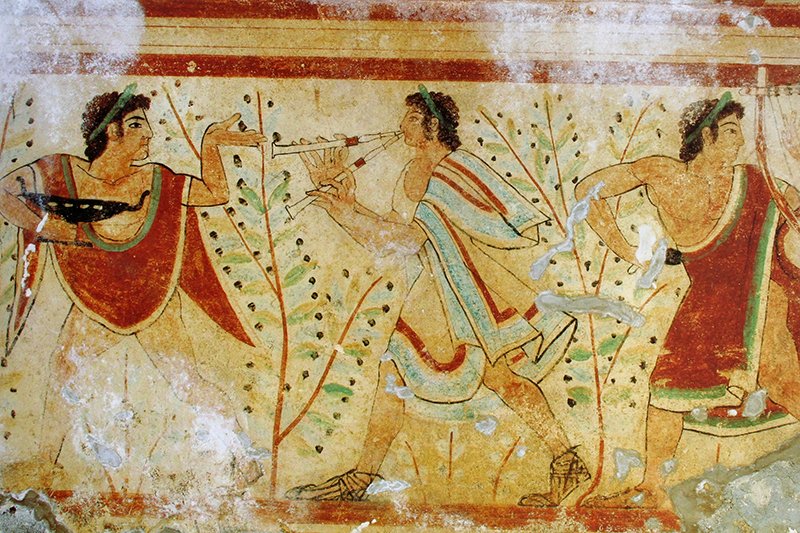
History of the Etruscans in Italy
The history of the Etruscans in Italy is a journey through one of the most enigmatic and influential civilizations of the ancient world. The Etruscans, whose origins are still debated by scholars, thrived in Italy from the 8th to the 4th century BCE.
The Etruscan Origins and Territory
The Etruscans are believed to have emerged as a distinct people in what is now modern-day Tuscany, Italy, around the 8th century BCE. Their territory, known as Etruria or Tyrrhenia, extended across central Italy, encompassing regions of modern Tuscany, Umbria, and Lazio. Etruria was a confederation of city-states, each with its own rulers and customs.
Etruscan Society and Culture
The Etruscans developed a sophisticated and distinctive culture that greatly influenced the ancient Mediterranean world. Their society was organized into city-states, and they were known for their skilled metalworking, pottery, and architecture. Etruscan art and craftsmanship displayed a unique blend of indigenous styles and influences from neighboring civilizations such as the Greeks and Phoenicians.
Language and Writing
One of the enduring mysteries of the Etruscans is their language. The Etruscan script, known as the Etruscan alphabet, remains only partially deciphered, making it a subject of ongoing linguistic research. The Etruscans had their own distinct language, which was written from right to left and has posed a challenge for modern scholars attempting to unlock its secrets.
Religion and Beliefs
The Etruscans had a complex religious belief system, with a pantheon of gods and goddesses, many of whom were adopted from other Mediterranean cultures. The practice of divination, particularly the reading of omens from the flight patterns of birds, was a significant aspect of their religious life. Etruscan tombs often contain intricate paintings and sculptures depicting scenes from the afterlife, providing valuable insights into their beliefs about the hereafter.
Etruscan Influence on Rome
The Etruscans played a crucial role in shaping the early development of Rome. In the 7th century BCE, Rome was a small settlement located in close proximity to Etruscan territories. As Rome expanded, it came into contact with Etruscan culture, and significant elements of Etruscan civilization were absorbed by the burgeoning Roman state.
The Etruscans introduced the Romans to various aspects of their culture, including the use of the arch in architecture, the practice of augury (divination through observing bird flight), and the Etruscan alphabet. The Roman Republic, which would later evolve into the Roman Empire, adopted and adapted many of these Etruscan customs and technologies.
Etruscan Art and Influence on Roman Art
Etruscan art was characterized by its unique style and use of materials. Etruscan artists were skilled in crafting bronze, terracotta, and painted pottery. Their artistic achievements influenced Roman art, particularly in the development of portraiture and the use of terracotta for architectural decoration.
Etruscan tombs, adorned with frescoes depicting scenes of daily life, funerary rituals, and mythical stories, are notable examples of their artistic legacy. These tombs offer valuable insights into Etruscan society and aesthetics.
Etruscan Decline and Disappearance
The decline of the Etruscans began in the 4th century BCE, as they faced external pressures from neighboring Italic tribes and, eventually, the expansionist Roman Republic. Etruria gradually lost its independence and was incorporated into the Roman state by the 1st century BCE.
The reasons for the decline of Etruscan culture are still debated by historians. Some theories attribute it to military defeats, while others suggest changes in trade routes and the absorption of Etruscan culture by the expanding Roman society.
Etruscan Legacy in Italy
Despite their decline and eventual disappearance as a distinct civilization, the Etruscans left an enduring legacy in Italy:
Roman Heritage
The Etruscans significantly influenced the early development of Rome, shaping the Roman Republic and contributing to its architectural and religious traditions.
Artistic and Architectural Influence
Etruscan art and architectural techniques, such as the use of the arch, continued to impact Roman and subsequent Italian architecture.
Cultural Heritage
Elements of Etruscan culture, including their language and religious practices, are embedded in Italy's cultural heritage.
Historical Interest
The study of the Etruscans remains a captivating field of research and fascination for historians, archaeologists, and art enthusiasts.
Conclusion
The history of the Etruscans in Italy is a story of an ancient civilization that thrived and influenced the development of Italy and the broader Mediterranean world. From their enigmatic language to their distinctive art and architectural contributions, the Etruscans continue to captivate the imagination and inspire exploration into the depths of Italy's rich historical tapestry.








